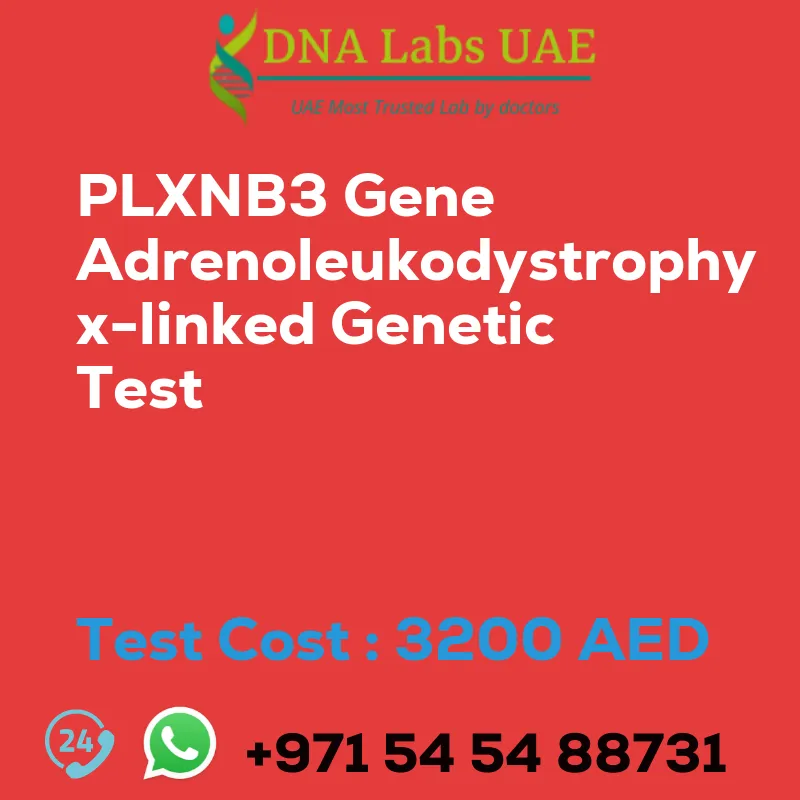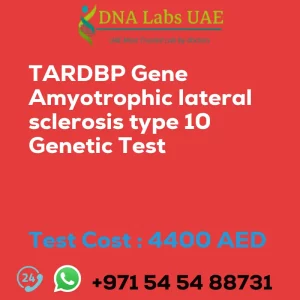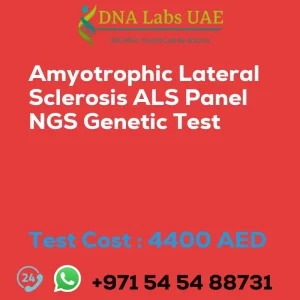PLXNB3 Gene Adrenoleukodystrophy x-linked Genetic Test
Test Name: PLXNB3 Gene Adrenoleukodystrophy x-linked Genetic Test
Components: Blood or Extracted DNA or One drop Blood on FTA Card
Price: 3200.0 AED
Sample Condition: Blood or Extracted DNA or One drop Blood on FTA Card
Report Delivery: 3 to 4 Weeks
Method: NGS Technology
Test Type: Neurological Disorders
Doctor: Neurologist
Test Department: Genetics
Pre Test Information: Clinical History of Patient who is going for PLXNB3 Gene Adrenoleukodystrophy, x-linked NGS Genetic DNA Test. A Genetic Counselling session to draw a pedigree chart of family members affected with PLXNB3 Gene Adrenoleukodystrophy, x-linked.
Test Details: Adrenoleukodystrophy (ALD) is a rare genetic disorder that affects the nervous system and adrenal glands. It is caused by mutations in the PLXNB3 gene, which is located on the X chromosome. NGS (Next-Generation Sequencing) is a genetic testing method that allows for the analysis of multiple genes at once, including the PLXNB3 gene. This test can identify mutations in the PLXNB3 gene that may be responsible for ALD. The PLXNB3 gene provides instructions for making a protein that is involved in the growth and development of nerve cells and the adrenal gland. Mutations in this gene can disrupt the function of the protein, leading to the symptoms of ALD. Symptoms of ALD can include difficulty with coordination and balance, changes in behavior and cognition, vision loss, and adrenal gland dysfunction. The severity and progression of symptoms can vary widely among individuals with ALD. NGS genetic testing for ALD can help with early diagnosis and management of the condition. Treatment options may include medications to manage symptoms, hormone replacement therapy for adrenal gland dysfunction, and stem cell transplantation in certain cases. It is important to note that ALD is an X-linked disorder, meaning that it primarily affects males. Females can also be carriers of the condition and may have mild symptoms or no symptoms at all. Genetic counseling is recommended for individuals and families with a history of ALD to better understand the risks and options for testing and management.
| Test Name | PLXNB3 Gene Adrenoleukodystrophy x-linked Genetic Test |
|---|---|
| Components | |
| Price | 3200.0 AED |
| Sample Condition | Blood or Extracted DNA or One drop Blood on FTA Card o |
| Report Delivery | 3 to 4 Weeks |
| Method | NGS Technology |
| Test type | Neurological Disorders |
| Doctor | Neurologist |
| Test Department: | Genetics |
| Pre Test Information | Clinical History of Patient who is going for PLXNB3 Gene Adrenoleukodystrophy, x-linked NGS Genetic DNA Test A Genetic Counselling session to draw a pedigree chart of family members affected with PLXNB3 Gene Adrenoleukodystrophy, x-linked |
| Test Details |
Adrenoleukodystrophy (ALD) is a rare genetic disorder that affects the nervous system and adrenal glands. It is caused by mutations in the PLXNB3 gene, which is located on the X chromosome. NGS (Next-Generation Sequencing) is a genetic testing method that allows for the analysis of multiple genes at once, including the PLXNB3 gene. This test can identify mutations in the PLXNB3 gene that may be responsible for ALD. The PLXNB3 gene provides instructions for making a protein that is involved in the growth and development of nerve cells and the adrenal gland. Mutations in this gene can disrupt the function of the protein, leading to the symptoms of ALD. Symptoms of ALD can include difficulty with coordination and balance, changes in behavior and cognition, vision loss, and adrenal gland dysfunction. The severity and progression of symptoms can vary widely among individuals with ALD. NGS genetic testing for ALD can help with early diagnosis and management of the condition. Treatment options may include medications to manage symptoms, hormone replacement therapy for adrenal gland dysfunction, and stem cell transplantation in certain cases. It is important to note that ALD is an X-linked disorder, meaning that it primarily affects males. Females can also be carriers of the condition and may have mild symptoms or no symptoms at all. Genetic counseling is recommended for individuals and families with a history of ALD to better understand the risks and options for testing and management. |








